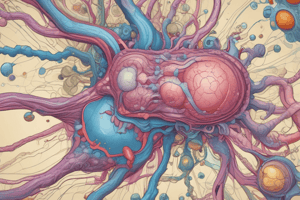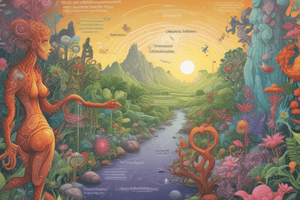Podcast
Questions and Answers
What is biology?
What is biology?
- The study of rocks
- The study of life (correct)
- The study of space
- The study of plants
What does organization refer to in biology?
What does organization refer to in biology?
The high degree order within an organism's internal and external parts and its interactions with the living world.
What is a cell?
What is a cell?
The smallest unit that can perform a life process.
Unicellular organisms are made up of multiple cells.
Unicellular organisms are made up of multiple cells.
Multicellular organisms consist of multiple cells.
Multicellular organisms consist of multiple cells.
What are organ systems?
What are organ systems?
What do organs do?
What do organs do?
What are tissues?
What are tissues?
What are tissues made up of?
What are tissues made up of?
What are organelles?
What are organelles?
Define biological molecules.
Define biological molecules.
What are atoms?
What are atoms?
What is homeostasis?
What is homeostasis?
What is metabolism?
What is metabolism?
What is cell division?
What is cell division?
How does development occur?
How does development occur?
What is reproduction?
What is reproduction?
What is a gene?
What is a gene?
What is observation?
What is observation?
Define hypothesis.
Define hypothesis.
What is a prediction?
What is a prediction?
What is an experiment?
What is an experiment?
What is a controlled experiment?
What is a controlled experiment?
What is a control group?
What is a control group?
What is an experimental group?
What is an experimental group?
What is an independent variable?
What is an independent variable?
What is a dependent variable?
What is a dependent variable?
What is a theory?
What is a theory?
What is peer review?
What is peer review?
What is spontaneous generation?
What is spontaneous generation?
How does biology affect a person's daily life?
How does biology affect a person's daily life?
How does biology affect society?
How does biology affect society?
Name the characteristics shared by living things.
Name the characteristics shared by living things.
Summarize the hierarchy of organization found in complex multicellular organisms.
Summarize the hierarchy of organization found in complex multicellular organisms.
Flashcards are hidden until you start studying
Study Notes
Key Biology Terms and Definitions
- Biology: Study of life encompassing various aspects of living organisms.
- Organization: Refers to the structured and ordered arrangement in an organism's parts and their interactions with the environment.
- Cell: The basic unit of life capable of performing essential life processes.
- Unicellular: Organisms consisting of a single cell.
- Multicellular: Organisms composed of multiple cells working together.
- Organ Systems: Combinations of specialized parts that perform specific functions in an organism.
- Organs: Distinct structures that serve specialized functions within organ systems.
- Tissues: Groups of similar cells that collectively perform specific functions in organs.
Levels of Biological Organization
- Organelles: Tiny structures within cells that perform necessary functions to sustain life.
- Biological Molecules: Chemical compounds that contribute to structural integrity and facilitate movement, energy use, and various biological functions.
- Atoms: The simplest particle of an element that retains its chemical properties.
Homeostasis and Metabolism
- Homeostasis: The process of maintaining stable internal conditions despite changing external environments.
- Metabolism: The total of chemical reactions within an organism that manage energy and materials from the environment.
Processes of Life
- Cell Division: The formation of two new cells from a parent cell, essential for growth and reproduction.
- Development: The process through which an organism matures into an adult.
- Reproduction: The biological process by which organisms create new individuals similar to themselves.
Genetics and Research Methodology
- Gene: A segment of DNA encoding instructions for a specific trait.
- Observation: The act of noticing natural occurrences, leading to inquiries or questions.
- Hypothesis: A proposed explanation for a natural phenomenon, guiding further investigation.
- Prediction: A forecast of outcomes based on the hypothesis in a testing scenario.
Experimental Design
- Experiment: A method to test hypotheses and their predictions.
- Controlled Experiment: Compares an experimental group with a control group, differing by only one variable.
- Control Group: Serves as a reference point in experiments for comparison against the experimental group.
- Experimental Group: Similar to the control group but modified by one independent variable.
- Independent Variable: The variable that is altered by the experimenter.
- Dependent Variable: The variable that is measured, responding to changes in the independent variable.
Scientific Understanding
- Theory: A well-substantiated explanation derived from a set of confirmed hypotheses.
- Peer Review: Process involving evaluation of research papers by experts to ensure validity.
Historical Perspectives and Life Application
- Spontaneous Generation: A historical belief that living organisms could arise from non-living matter.
- Biology's Impact on Daily Life: Influences decisions regarding diet, exercise, and health maintenance.
- Biology's Impact on Society: Contributes to addressing real-world challenges, including food supply improvement, disease treatment, and environmental conservation.
Characteristics of Living Things
- Common attributes include organization, response to stimuli, homeostasis, metabolism, growth, reproduction, and evolutionary change.
Hierarchy of Complex Organisms
- Complex life forms consist of a structured hierarchy: atoms → biological molecules → organelles → cells → tissues → organs → organ systems → organisms.
Studying That Suits You
Use AI to generate personalized quizzes and flashcards to suit your learning preferences.




